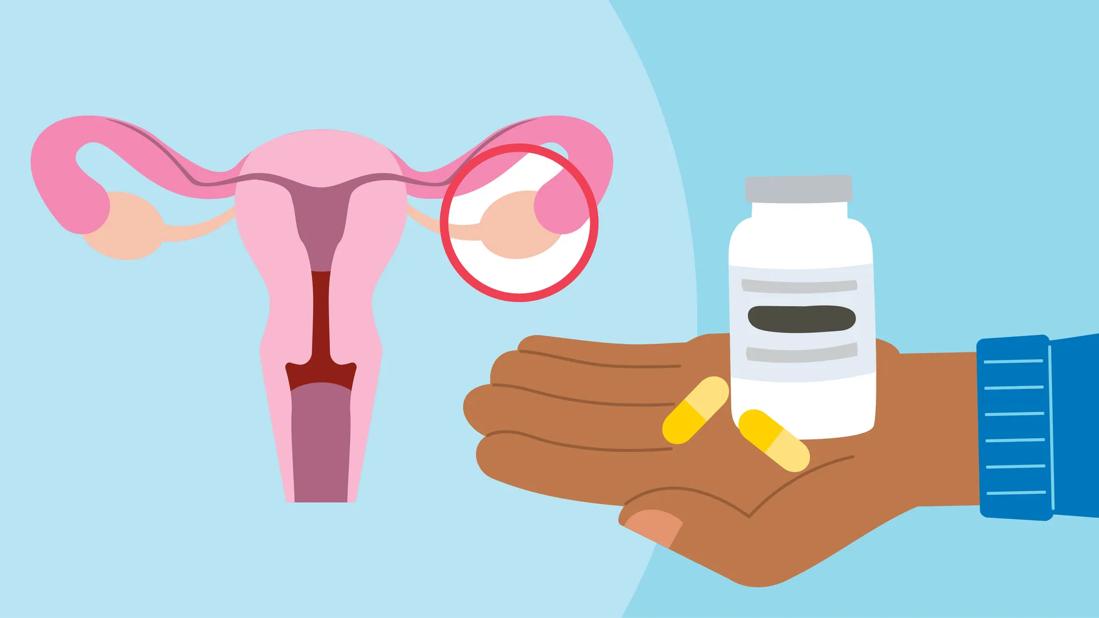The supplement may help with weight management and blood sugar levels

Image content: This image is available to view online.
View image online (https://assets.clevelandclinic.org/transform/bfc7e812-b4d9-4595-93f1-0b6f05a8f225/hands-hold-pills-1495644674)
Hand holds bottle of yellow capsules, with anatomical uterus with ovaries circled
If you have polycystic ovary syndrome (PCOS), you may be using medication and lifestyle changes to help manage your symptoms.
Advertisement
Cleveland Clinic is a non-profit academic medical center. Advertising on our site helps support our mission. We do not endorse non-Cleveland Clinic products or services. Policy
And you may have heard that you can use the supplement berberine for PCOS.
Learn about how the popular supplement may benefit this common condition.
“PCOS is a combination of hormonal and metabolic imbalances, in addition to insulin resistance,” says functional medicine specialist Layth Tumah, MD. “Regular use of berberine individually may help those measures, which may result in a better overall management of PCOS.”
Here are some of the possible ways the supplement can help people who have PCOS.
It’s common for people with PCOS to also have insulin resistance, which can develop into Type 2 diabetes. Insulin helps you process sugar for energy. And if you have insulin resistance, this can increase the amount of sugar in your blood. An increase in insulin can lead to weight gain (due to its anabolic effect) and cause your ovaries to make more male hormones, which can suppress ovulation.
Dr. Tumah says research shows that berberine may improve fasting blood sugar and fasting insulin, which are markers of insulin resistance.
PCOS can cause weight gain, especially around your midsection. While a well-balanced diet and exercise can help maintain a healthy weight, some research shows that taking berberine as a complementary treatment may help.
Advertisement
“A 2022 study on women with PCOS compared berberine (500 milligrams twice a day) to other agents (including metformin). It showed that berberine may have greater potential to reduce the risk of cardiovascular disease than metformin in PCOS patients due to its effect on body composition, lipid profile and improvement in hormone status,” reports Dr. Tumah. “Additionally, berberine shows a greater reduction in waist circumference and waist-to-hip ratio compared to the metformin group.”
If you have PCOS, you have a higher risk of heart disease.
While more research is needed to understand the relationship between berberine and heart health, some initial research shows that the supplement may help increase your “good” (HDL) cholesterol while reducing your total cholesterol, “bad” (LDL) cholesterol and blood triglycerides.
As with many of the potential benefits of berberine, again, more research is needed.
While there have been a few small studies on the topic, Dr. Tumah says that berberine may be considered a safe botanical compound to use in premenopausal women with PCOS who want to become pregnant because of its few side effects.
But its effect on increasing your chances of being pregnant is unclear and he hasn’t seen any strong evidence to support those claims.
Dr. Tumah says that studies had participants take the supplement over a period of three to six months.
“In order to see some benefits for PCOS, I’d recommend at least three months of continued use,” he advises. “If you experience positive improvement in your markers, continuing supplementation might be reasonable.”
The supplement is available as a capsule, liquid or powder. Dr. Tumah says that he typically recommends 500 milligrams twice a day, which can be increased to 500 milligrams three times a day. It’s also best if you take each dose before a meal.
An important note: Berberine is a supplement, which isn’t regulated or reviewed by the U.S. Food and Drug Administration (FDA). It also lacks long-term studies to prove the safety and efficacy of long-term use.
While berberine is safe for most people to use, there are some possible side effects, like abdominal discomfort, constipation, diarrhea and nausea. If you notice side effects, Dr. Tumah says you can reduce the amount of berberine you take each day to minimize symptoms.
And you shouldn’t take berberine if you’re pregnant or breastfeeding. It also isn’t recommended for babies and children.
There’s preliminary research that shows berberine may be helpful in the management of PCOS. If you’re interested in learning more, Dr. Tumah recommends talking to your healthcare provider, who can provide guidance if berberine is right for you.
Advertisement
Advertisement

Sign up for our Health Essentials emails for expert guidance on nutrition, fitness, sleep, skin care and more.
Learn more about our editorial process.
Advertisement
Hormonal imbalances and insulin resistance can cause weight to accumulate around your midsection
Diet won’t cure polycystic ovary syndrome, but healthy eating can help you feel your best
PCOS can cause skin problems, but birth control pills, hormonal medications and topicals can help
The common hormonal condition is linked to insulin resistance, which can cause weight gain
While this hormonal condition can be hereditary, there are other risk factors to also consider
Lifestyle changes, like a healthy diet and exercise, can help with fertility issues
How these lifestyle changes may help restore insulin sensitivity
Certain supplements, like licorice root and St. John’s wort, can raise your blood pressure or negatively interact with medication
Although it could be used as a moisturizer, this new trend is not recommended
Communicating clear limits helps protect your time, energy and emotional well-being
High cholesterol can be genetic, but testing and treatment can lower your heart disease risk